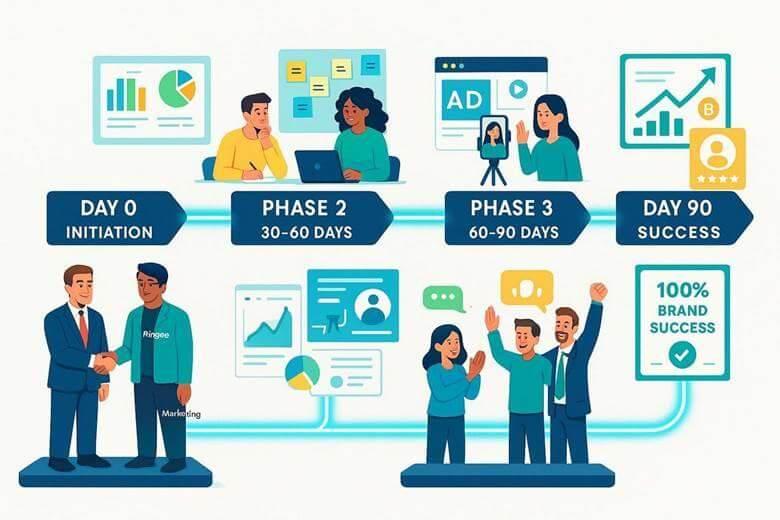Starting to work with a marketing agency is an important step for any business, whether you want to grow your reach or hand over the daily marketing tasks.
The first 90 days are very important-they set up the relationship and help create a path to growth, bring in the right customers, and take some of the daily marketing work off your plate.
In these first three months, the agency will set clear goals, define how success will be measured, and start campaigns across several areas like content, social media, and PR agencies.
By the end of this first stage, you should notice real changes and have a better plan in place for future success and a stronger position than your competitors.
Why the First 90 Days Matter for Marketing Results
The first 90 days are not just for introductions; they are a time when the agency puts a focused plan in place to help your business grow.
This stage helps both you and the agency make sure that your goals match up. It’s a time to build trust and set up all the basics needed for digital marketing that works.
Think of it like building the base of a tall building-without a strong start, the rest won’t stand well. Good work in the first 90 days means you’ll see results sooner, have a clearer plan, and know how your investment connects to your business goals.
What Is the Typical Onboarding Process?
Onboarding with a marketing agency follows an organized plan to connect their team to your business. It starts with a deep dive into your company, your market, and your current marketing.
This stage usually includes detailed reviews of what you’re already doing, goal-setting meetings, and setting up good ways to talk. Expect several meetings, talks about your target audience and competitors, and working out which numbers will show success (KPIs).
This is a team effort-both sides need to agree on what needs to be done, building a good, honest relationship from the beginning.
Days 1-30: Laying the Groundwork
The first month is all about learning and setting things up. The agency will get all the information they need about your business and what makes it different. They look closely at what your business wants to achieve and get everything ready for the next steps.
Aligning Goals and Setting KPIs
During this early stage, the agency and your company will work together to set goals that truly fit your vision. This is a careful process that gives direction for measuring results.
These goals become the basis for choosing the right KPIs (key performance indicators), which will help guide every campaign from here on out.

Why Goal Setting Matters
The agency will ask you what is most important: Do you want more people to know about your brand? Do you want to get more leads? Or is increasing sales your top priority?
When the agency knows exactly what you want, they can plan a strategy just for you; not a generic one. This way, all marketing work focuses on what matters most to your business.
How Agencies Stay on Track With Goals
Once the main goals are set, the agency picks specific KPIs-such as website visits, likes or shares, and lead conversions. These measurements help see how the plan is working and point out where to improve.
The agency then maps out a step-by-step plan to reach each goal. Regular meetings are scheduled to check progress and discuss if anything should be changed. By using updated data, the agency can spot patterns and keep the plan moving in the right direction, adjusting as needed.
Initial Brand and Marketing Audit
After setting goals, the next step is a full review of your brand’s online presence. This audit checks where you are doing well, where you’re missing out, and how you can grow. This checkup is key for shaping your marketing plan.
What an Audit Does
The agency will carefully examine all your digital tools-website, social channels, ad accounts, and more. They’ll find what works and what needs fixing so they know where to focus first for better results. The audit also checks your competitors to see how you can stand out in the market.
Using Audit Results in Practice
The audit looks at your audience-what age, what interests, what habits. This helps fine-tune your message so it connects with the right people.
The agency will also plan out your content so it matches gaps or needs they find. This step even covers fixing technical problems, like slow-loading pages or broken links, which helps make your site easier to find and use.
Finally, the audit guides smarter choices for improving your social media and paid ad strategies to get the best results for your investment.
Setting Up Communication and Expectations
Building good communication is a must from the start. The first meetings are important because they decide how everyone will talk, how often you’ll get updates, and who does what.
The aim is to make sure everyone knows what’s expected, so your ideas count and the agency can make the most of their skills. You’ll talk about the best ways to communicate-email, calls, project tools-so you stay involved but don’t get stuck in daily details.
Days 30-60: Strategy and Early Planning
In the second month, the agency moves from learning about your business to putting plans together. All the details gathered in the first month are now turned into a specific strategy made for your goals.
Creating a Realistic Marketing Plan
With audits and goals in place, the agency can now write up a plan made to get results for your business. This usually covers content, SEO, social media, and digital ads all working together. Everything in the plan is chosen carefully to connect with both your short-term and long-term goals.
How a Custom Plan Helps
A good plan makes a big difference. For example, the agency will mix keyword-friendly articles with topics that your audience actually cares about to attract better leads.
They’ll also set up ad campaigns (like on Google or Facebook) that are designed to get the most out of your budget. Social media is another focus. With spending on ads reaching about $270 billion in 2023, it’s a major part of marketing now.
The agency will make sure your posts are consistent and relevant so your brand stays in people’s minds. This personalized approach makes each dollar and each post work harder for your business.
Working Together: Client and Agency Roles
Marketing works best as teamwork. The agency will involve you in making key decisions and keep you updated, but also let you step back from daily work. Your views and feedback matter, so both sides can use their strengths and build a very effective marketing system together.

Planning Timelines and Approvals
When the plan is ready, the agency will share a schedule that lists out what will happen and when-like when a blog will go live or when an ad will launch. There’s an approval stage too. You will check the plans and creative work to make sure they match your brand and any legal requirements. This avoids surprises and makes the process smoother for everyone.
Days 60-90: Starting Campaigns and Improving Them
By the third month, all the planning turns into action as your campaigns are launched. This is when you see how your agency’s work starts to make real changes, and the agency collects valuable feedback from the real world.
Launching Your First Campaigns
With the full plan set, the agency will start rolling out different campaigns-content pieces, social posts, SEO fixes, and paid ads. Everything is made to reach your goals, and the agency keeps an eye on the results to make small changes if needed.
How Agencies Put Campaigns Into Action
This stage is organized, with blog posts, videos, or graphics being published to draw in your target customers and improve your search rankings. At the same time, paid ads go live to attract leads quickly. The early stats from these ads help show what’s working or what isn’t. Social media posts also start to go out, with adjustments to timing or style to maximize reach and response.
Making Sure Things Go Smoothly
To keep things running well, the agency sets up strong tracking to see how each campaign is doing right away. If something isn’t working, they can adjust quickly.
Regular progress check-ins make sure you’re always up to date. By watching key numbers-like clicks, likes, or conversions-the agency can quickly react and keep your marketing efforts on track.
Checking Results and Making Early Changes
As soon as the campaigns start getting results, the agency keeps a close watch to find ways to improve. Early data helps them spot what people like or which times give most engagement. If any part of the plan isn’t working, quick changes are made to get better results.
Why Monitoring Matters
The agency will look for trends in the data, like when your audience is online or which content they like best. This helps improve targeting and engagement. If a campaign is weak, they’ll figure out why and fix it quickly to keep everything on track for your main goals.
How Agencies Keep Improving Campaigns
The goal is to always get better. The agency will test new images, wording, or calls to action to keep your ads interesting and more likely to lead to results. They’ll also refresh your content to use trending keywords and update social and email campaigns based on what’s working.
For reference, email marketing has a solid conversion rate-2.8% for B2C and 2.4% for B2B-so making the most of this is important. Making constant improvements helps your marketing adapt to your audience and the market.

Reporting, Communication, and What Comes Next
When the 90 days finish, it’s time to look at reports, talk about what’s working, and plan for the future. This is when you pull together everything you’ve learned to keep moving forward.
How Involved Should Clients Be?
Your agency will handle most of the work, but your feedback and involvement are still important, especially in these first months. You need to join in meetings, give insights about your business, and review creative work so strategies stay true to your brand. This helps make sure the partnership leads to success.
How Agencies Report Results and Explain Data
At the end of 90 days, your agency will put together a straightforward report. This shows what was achieved, any problems faced, and main insights from each campaign. The report sums up the data so you and others at your company can see what impact the work has made and whether the investment paid off.
How Agencies Make Reports Useful
Good agencies go beyond just listing numbers-they also share what those findings mean, like which types of content people liked best or new trends they noticed. The report should offer suggestions for next steps, based on real results, so you know what to focus on next.
How to Plan New Campaigns After 90 Days
With strong insights from these first months, the agency will help you shape or tweak your strategy so it fits what you want to achieve. This might mean investing more where you’ve seen great results, or trying new things in areas with lots of engagement.
Regular checks and small updates will keep your strategy current and competitive, making sure your digital presence keeps getting stronger over time.
FAQs
How Soon Can You See Results?
How quickly you see changes depends on the type of marketing. Paid ads can show effects in just a few weeks, since they get your message out right away. Longer-term plans, like SEO or building up a content library, usually take a few months to show big gains-but you should see the first signs of progress between three and six months. Early wins give you information to keep getting better.
Can Agencies Help with Branding and Content?
Yes, many agencies help shape your brand’s look and message, as well as create content. This might include updating your logo, coming up with new taglines, and producing blogs, videos, and pictures. The agency often handles everything from researching topics to writing and publishing so your brand stays strong and consistent everywhere online, helping your other marketing and SEO work too.
Key Points for a Good Partnership with a Marketing Agency
The first 90 days with a marketing agency are not just for starting out-they create the main platform for long-term work together. This period is for learning about your business, setting clear goals, and launching first campaigns. By the end, you should know what your agency can do, understand your progress, and have solid plans for the future.
Setting clear targets and doing an early checkup of your digital presence are very important. Custom plans in content, SEO, social media, and ads drive your results, while early campaigns bring vital data.
Frequent updates and regular planning keep your efforts on the right track and support lasting business growth and a solid agency partnership.



